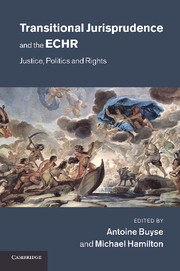Book contents
- Frontmatter
- Contents
- Foreword
- Acknowledgements
- 1 Introduction
- 2 Transitional emergency jurisprudence
- 3 Rights and victims, martyrs and memories
- 4 Confronting the consequences of authoritarianism and conflict
- 5 Freedom of religion and democratic transition
- 6 The truth, the past and the present
- 7 Transition, political loyalties and the order of the state
- 8 Transition, equality and non-discrimination
- 9 Closing the door on restitution
- 10 The Inter-American human rights system and transitional processes
- 11 The ???transitional??? jurisprudence of the African Commission on Human and Peoples??? Rights
- 12 Conclusions
- Index
- References
11 - The ???transitional??? jurisprudence of the African Commission on Human and Peoples??? Rights
Published online by Cambridge University Press: 07 September 2011
- Frontmatter
- Contents
- Foreword
- Acknowledgements
- 1 Introduction
- 2 Transitional emergency jurisprudence
- 3 Rights and victims, martyrs and memories
- 4 Confronting the consequences of authoritarianism and conflict
- 5 Freedom of religion and democratic transition
- 6 The truth, the past and the present
- 7 Transition, political loyalties and the order of the state
- 8 Transition, equality and non-discrimination
- 9 Closing the door on restitution
- 10 The Inter-American human rights system and transitional processes
- 11 The ???transitional??? jurisprudence of the African Commission on Human and Peoples??? Rights
- 12 Conclusions
- Index
- References
Summary
Introduction
The 1990s saw a wave of protests sweep across the African continent in the wake of the fall of the Soviet Union, ultimately leading to substantial political reforms, including the holding in many instances of the first competitive elections in decades and the installation of democratic or nominally democratic regimes in almost half of the fifty-three member states of the Organisation of African Unity (OAU). Simultaneous to these events, the African Commission on Human and Peoples’ Rights (the African Commission), which started operating in 1987 and which has a broad mandate in terms of the African Charter on Human and Peoples’ Rights (the African Charter) to promote as well as protect human rights on the continent, began to receive its first cases. This chapter considers the manner in which the African Commission has dealt with cases involving countries in conflict or transition as well as the extent to which the Commission has either in its case law or in terms of its promotional mandate addressed ‘transitional’ issues. The degree to which domestic actors have resorted to the African Charter and the jurisprudence of the African Commission in order to advance reform in situations of conflict or transition will also be considered. In the final instance, the potential of the newly created African Court on Human and Peoples’ Rights to address such matters, particularly in light of developments which would have the jurisdiction of the Court expanded to include the trying of international crimes such as genocide, war crimes and crimes against humanity, will also be examined.
- Type
- Chapter
- Information
- Transitional Jurisprudence and the ECHRJustice, Politics and Rights, pp. 267 - 285Publisher: Cambridge University PressPrint publication year: 2011



